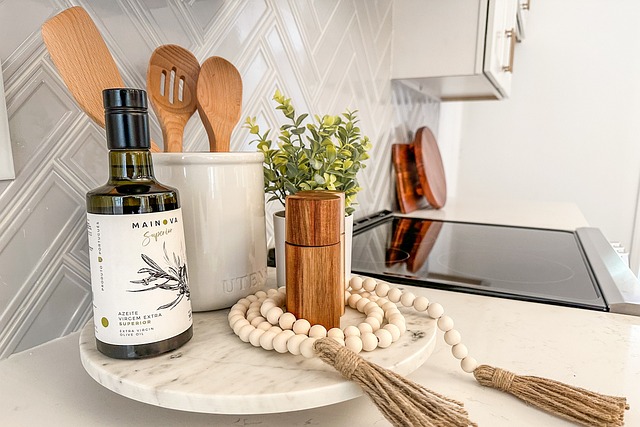For an eco-friendly kitchen remodel, prioritize sustainable design with recycled or sustainably sourced materials like bamboo countertops, FSC-approved cabinetry, and energy-efficient appliances. Choose low-VOC finishes for better air quality and proper insulation to reduce utility bills. Integrate natural lighting and green elements for a cost-effective, environmentally conscious kitchen renovation.
“Unleash your inner ecologist and transform your kitchen into an oasis of sustainability with our comprehensive guide to professional eco-friendly installations. Discover the art of choosing green materials, from recycled kitchen treasures to sustainable cabinetry, ensuring your renovation reduces environmental footprints. Learn to design energy-efficient kitchens, incorporating clever lighting and insulation for a truly eco-conscious space. We explore low-VOC remodels, improving indoor air quality, and offer tips for waste reduction, water conservation, and recycling in kitchen design. Embrace the future of culinary spaces with our expert insights on green kitchen renovation.”
- Choosing Eco-Friendly Materials for Your Kitchen Remodel
- – Discussion on sustainable cabinetry, recycled kitchen materials, and eco-friendly countertops
- – Tips for selecting materials that reduce environmental impact
- Designing an Energy-Efficient Kitchen
Choosing Eco-Friendly Materials for Your Kitchen Remodel
When planning a kitchen remodel, opting for eco-friendly materials is an excellent way to contribute to sustainable kitchen design. This approach not only reduces your environmental impact but also offers a wide range of aesthetically pleasing and practical options. Consider choosing recycled or sustainably sourced materials for your countertops, such as bamboo, granite from recycled content, or recycled glass. These choices can significantly lower the carbon footprint of your project while providing unique and durable finishes.
Additionally, sustainable cabinetry is a key component in an eco-friendly kitchen renovation. Look for manufacturers who use low-VOC (Volatile Organic Compound) finishes and prioritize the use of certified sustainable wood, like Forest Stewardship Council (FSC)-approved lumber. These cabinets can be made from recycled materials or designed with disassembly in mind to facilitate future recycling. Incorporating energy-efficient appliances and proper insulation will further enhance your green kitchen renovation, ensuring a more comfortable space while reducing utility bills.
– Discussion on sustainable cabinetry, recycled kitchen materials, and eco-friendly countertops
When it comes to creating an eco-friendly kitchen, sustainable cabinetry is a key component. Not only do these cabinets offer durability and style, but they’re often crafted from reclaimed or sustainably sourced materials, reducing environmental impact. From bamboo and cork to recycled wood, these options provide both aesthetics and a commitment to green kitchen renovation. Incorporating sustainable cabinetry sets the tone for the rest of the space.
Complementing these cabinets are recycled kitchen materials and eco-friendly countertops. Innovation in manufacturing has led to an array of choices for consumers looking to minimize their carbon footprint. Recycled glass, stainless steel, and even upcycled appliances can replace traditional options, while eco-friendly countertops like reclaimed stone or biodegradable materials offer durability and uniqueness. For those seeking a low-VOC kitchen remodel, these products are not only energy-efficient but also promote better air quality, ensuring a healthier living space.
– Tips for selecting materials that reduce environmental impact
When designing an eco-friendly kitchen, selecting the right materials is a key step in reducing your environmental impact. Opt for sustainable cabinetry made from reclaimed or certified sustainable wood, which not only minimizes deforestation but also adds character to your space. Recycled kitchen materials, such as countertops made from recycled glass, stone, or even plastic bottles, are excellent choices that divert waste from landfills. Additionally, consider low-VOC (volatile organic compound) finishes for cabinets and walls to improve indoor air quality, ensuring a healthier kitchen environment.
For an energy-efficient kitchen, choose appliances with high energy ratings and water-saving features. Eco-friendly kitchen ideas also incorporate natural lighting and proper insulation to reduce the need for artificial lighting and heating/cooling. Incorporating these sustainable elements into your green kitchen renovation contributes to a more harmonious relationship between your home and the planet.
Designing an Energy-Efficient Kitchen
When designing an eco-friendly kitchen, every detail matters. Sustainable kitchen design isn’t just about choosing recycled materials; it’s about creating a space that minimizes energy consumption and waste generation. Start with efficient appliances that bear the ENERGY STAR label, which guarantees they meet strict energy performance standards. Integrate smart technology like motion sensors for lighting to avoid unnecessary energy usage.
Consider sustainable cabinetry made from fast-growing or reclaimed woods, paired with eco-friendly countertops such as recycled glass or bamboo. A low-VOC (volatile organic compound) kitchen remodel ensures better air quality and reduces the environmental impact of finishes. Additionally, proper insulation and energy-efficient windows can significantly lower heating and cooling bills, making your green kitchen renovation both environmentally friendly and cost-effective.
In conclusion, professional installations for sustainable kitchens offer a compelling blend of environmental stewardship and modern aesthetics. By choosing eco-friendly materials like sustainable cabinetry, recycled kitchen components, and low-VOC countertops, homeowners can reduce their carbon footprint while enjoying a beautiful, efficient space. Designing an energy-efficient kitchen further streamlines resources, ensuring a green kitchen renovation that’s both functional and future-forward. Embrace these eco-conscious ideas for a kitchen that not only serves your family but also contributes to a healthier planet.
